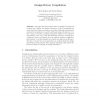Free Online Productivity Tools
i2Speak
i2Symbol
i2OCR
iTex2Img
iWeb2Print
iWeb2Shot
i2Type
iPdf2Split
iPdf2Merge
i2Bopomofo
i2Arabic
i2Style
i2Image
i2PDF
iLatex2Rtf
Sci2ools
100
click to vote
CC
2001
Springer
2001
Springer
Design-Driven Compilation
This paper introduces design-driven compilation, an approach in which the compiler uses design information to drive its analysis and verify that the program conforms to its design. Although this approach requires the programmer to specify additional design information, it offers a range of benefits, including guaranteed fidelity to the designer’s expectations of the code, early and automatic detection of design nonconformance bugs, and support for local analysis, separate compilation, and libraries. It can also simplify the compiler and improve its efficiency. The key to the success of our approach is to combine high-level design specifications with powerful static analysis algorithms that handle the low-level details of verifying the design information.
CC 2001 | Compiler Uses Design | Design Information | Design Nonconformance Bugs | System Software |
| Added | 28 Jul 2010 |
| Updated | 28 Jul 2010 |
| Type | Conference |
| Year | 2001 |
| Where | CC |
| Authors | Radu Rugina, Martin C. Rinard |
Comments (0)

